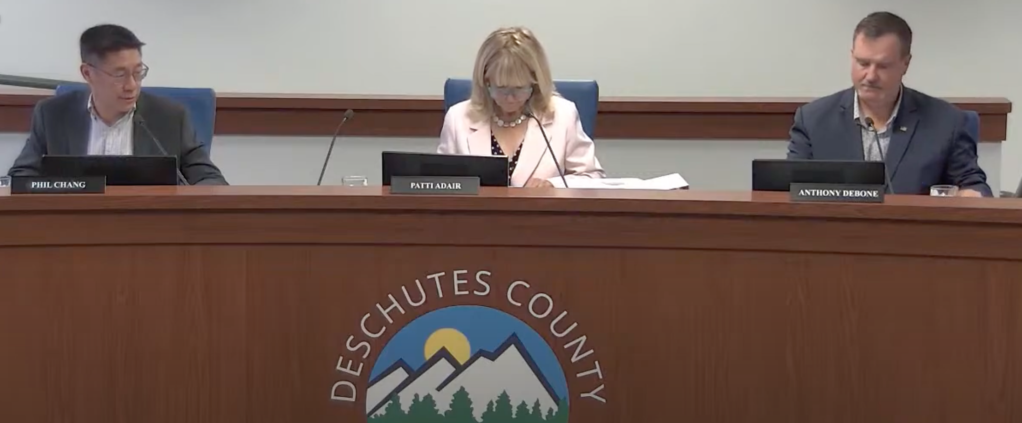Voters to decide on expanded Deschutes County Commission
Published 5:30 am Friday, September 27, 2024

- Deschutes County Commissioners, seen here in a screenshot, meet on Sept. 4.
A citizens’ initiative to expand the Deschutes County Commission from three members to five has found its way to the 2024 general election ballot.
Only seasoned local voters would remember the last time this issue appeared on Deschutes County ballots — in 2006, when the public shot down a County Commission reform package that included adding two commissioners, making them nonpartisan and creating geographic districts.
But since then Deschutes County’s population growth has exploded to more than 200,000.
Initiative to expand Deschutes County Commission headed to November ballot
Growth is a key argument for Measure 9-173’s backers, who say it’s time to modernize a board that has consisted of three members since Deschutes County was formed in 1916 with a population of 5,000.
Winds of change came to the County Commission in 2022, when voters nixed partisan elections with a ballot measure.
Last year, John Heylin, a local business owner and member of civic groups and committees, started advocating to the sitting commissioners for a ballot measure to add members.
He was unhappy with decisions made by the current three-member board.
When the board declined, Heylin and a group of volunteers launched a citizens’ initiative and collected more than 6,500 signatures to place it before voters.
“I’m feeling pretty good,” Heylin said six weeks ahead of Election Day. “A measure to expand the County Commission isn’t exactly a sexy topic. It’s fascinating that people are engaged in this.”
As summer drew to a close, a slew of elected officials and groups threw their support behind the measure: the Bend City Council, Sisters City Council, three Redmond city councilors and Mayor Ed Fitch, Bend-La Pine Schools board member Cameron Fischer, state Rep. Emerson Levy, plus Central Oregon LandWatch, the League of Women Voters and the Central Oregon Labor Chapter of the AFL-CIO.
Phil Chang, the lone Democrat on the Deschutes County Commission, also endorsed the measure. Along with increasing representation, he has argued, a five-member commission would bring more diligent fiscal decision-making, saving the county money, while commissioners would benefit from the ability to meet one-on-one with one another to hash out disagreements, which is not allowed for members of a three-person board under public meetings law.
Deschutes County Republicans, including Chang’s fellow Commissioners Patti Adair and Tony DeBone, have provided the most ardent opposition to the measure, arguing the benefits of increased representation would not outweigh the added costs of two commissioner salaries and other accommodations.
The base salary for commissioners is $130,000 plus benefits and other expenses.
A voter’s pamphlet statement from the Deschutes Republicans said taxes would need to be increased to pay the extra salaries. Kim Katchur, a spokesperson for the county, said taxes would not increase if the measure passes. The extra costs would be factored into the commissioners’ yearly budgeting process.
Either way, more elected officials will result in more money spent, not less, said Phil Henderson, a Republican and former Deschutes County Commissioner.
“I don’t think it’s necessary to get good government.”
Henderson said adding two commissioners would sacrifice transparency as the public would miss out on one-on-one conversations between commissioners.
“We have the most transparent county government form that you can have right now,” he said.
Aside from arguments against the measure, Republicans say it’s a partisan effort to pack the County Commission with Democrats, who would likely be in a better position to win the two extra seats, according to Henderson.
Measure 9-173 would take a simple majority of yes votes to pass. The two new seats would be elected in 2026 for a two-year term and then serve four-year terms following the 2028 election.
According to the Association of Oregon Counties, six of the state’s 36 counties are governed by five-member boards. Deschutes would be the smallest of those whose commissioners serve full time, behind three Portland-area jurisdictions — Multnomah, Washington and Clackamas — and Lane County, population 383,000. Clatsop and Hood River counties, each with populations under 50,000, both have five commissioners who are not full time.





